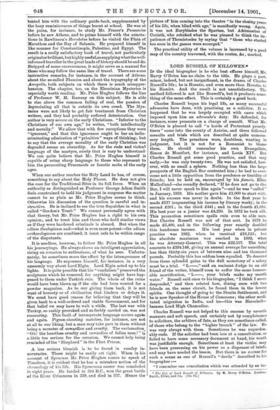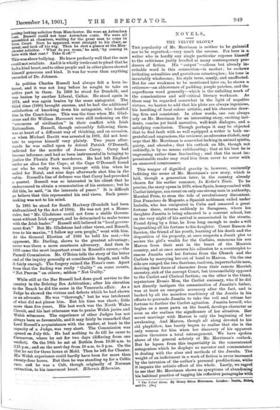• 'LORD RUSSELL OF KILLOWEN.*
Ii' the ideal biographer is he who best effaces himself, Mr, Barry O'Brien has no claim to the title. He plays a part, minor, indeed, but not insignificant, in the drama of Charles Russell's life ; he is Horatio, and even more than Horatio, to his Hamlet. And. the result is not unsatisfactory. The method followed is not like Boswell's, but it produces some- thing of the same effect. This is certainly a good book.
Charles Russell began his legal life, as many successful advocates have done, with practising as a solicitor. It so happened that he was largely occupied with cases which imposed upon him an advocate's duty. He defended, for instance, some peasants on a charge of assault. What Mr_ O'Brien is pleased to call "a horde of Protestant prosely- tisers" came into the county of Antrim, and there followed assaults and trials which are described at quite unneces- sary length. The preachers were, doubtless, wanting in judgment, but it is not for a Romanist to blame them. He should remember his own Evangelists, Simon de Montfort, for instance, and Louis XIV. But Charles Russell got some good practice, and that veiy early,—he was only twenty-two. He was not satisfied, how- ever, with so small a sphere. Nothing less than the large prospects of the Peglish Bar contented him he had to over- come not a little opposition from the prudence or timidity of friends; but he held on, encouraged by his fiancee, Ellen Mulholland—she roundly declared, "If he does not go to the Bar, I will never speak to him again "—and he was " called " in January, 1859. His mother gave him 21,000 to start with, and his success was never in doubt. In the that year he made 2117 (augmenting his income by literary work) ; in the second £261; in the third £441; and in the fourth 21,016. His best year as a junior was 24,230. In 1872 he took silk. This promotion sometimes spells ruin even to able men. But Charles Russell was not of that sort. In 1873 he made 25,400, and in the following year exactly doubled this handsome income. His hest year when in private practice was 1882, when he received 218,133; but the absolute maximum was reached in 1893, when he was Attorney-General. This was 222,517. The total amounts to 2334,149, giving an annual average for something less than thirty-six years of between nine and ten thousand pounds. Probably this has seldom been equalled. To descend from these splendid gains to the dull monotony of a salary must be a trial. "L—," said an eminent Judge to an old friend of the writer, himself soon to suffer the same honour- able mortification, "L—, your briefs make my mouth water." Russell said once to his biographer, "I think I never desponded," and then related how, dining once with two friends on the same circuit, he found them in the lowest spirits. One thought of going to the Straits Settlement, and he is now Speaker of the House of Commons; the other medi- tated migration to India, and he—this was Herschell- became Lord High Chancellor.
Charles Russell was not helped to this success by smooth manners and soft speech, and certainly not by complaisance to solicitors, the arbiters of fate, as they are sometimes called, of those who belong to the "higher branch" of the law. He was very abrupt with them. Sometimes he was unpardon- ably rude. If the solicitor had been late at a consultation, or failed to have some necessary document at hand, his wrath was justifiable enough. Sometimes at least the victim may have been presuming on his power as a dispenser of briefs, and may have needed the lesson. But there is no excuse for such a scene as one of Russell's " devils " described to his biographer :— " I remember one consultation which was attended by an im- • The We of Lord RueseU of Kiltowen. By E. Barry O'Brien. London: Smith, Elder, and Co. [les. 60.]
posing-looking solicitor from Manchester. He wore an Astrachan coat. Russell could not bear Astrachan coats. We were all assembled at chambers, waiting for the great man to come in from Court. Soon he appeared, went straight to his chair, as usual, and took off his wig. Then he shot a glance at the Man- chester solicitor. What do you mean,' he said, 'by coming in here with that coat P Take it off."
This was sbeer bullying. He knew perfectly well that the man could not retaliate. And it is wholly irrelevant to plead that he had a kind heart, and to other people and in other places showed himself generous and kind. It was far worse than anything recorded of Dr. Johnson.
In politics Charles Russell had always felt a keen in- terest, and it was not long before he sought to take an active part in them. In 1868 he stood for Dundalk, and was beaten by another Liberal, Callan. He stood again in 1874, and was again beaten by the same antagonist. The third time (1880) brought success, and he had the additional satisfaction of knocking down his antagonist, who hustled him in the Court-house. This was the time when Mr. Glad- stone and Sir William Harcourt were still reckoning on the "resources of civilisation" in their conflict with Irish Nationalism. Russell, though ostensibly following them, was at heart of a different way of thinking, and on occasion, as when Michael Davitt was arrested in 1881, did not hesi- tate to express himself very plainly. Two years after- wards he was called upon to defend Patrick O'Donnell, indicted for the murder of James Carey. Carey had become informer, and had so been instrumental in bringing to justice the Phcenix Park murderers. He had left England 'under an alias for the Cape; at the Cape O'Donnell found out who he really was, took passage with him when he sailed for Natal, and nine days afterwards shot him in the cabin. Russell's line of defence was that Carey had provoked a quarrel. Russell was so interested in his client- that he endeavoured to obtain a commutation of his sentence; but he did this, he said, "in the interests of peace." It is difficult to believe that this represented his real views. Such peace- making was not to his mind.
In 1885 he stood for South Hackney (Dandalk had been visfranchised by the Act of 1884). He was not yet a Home- ruler, but "Mr. Gladstone could not form a stable Govern- ment without Irish support, and he determined to make terms with the Irish leader." Russell still believed in "local govern- ment first." But Mr. Gladstone had other views, and Russell, true to his maxim, "I follow my own people," went with him.
At the General Election of 1886 he held his seat,—his -opponent, Mr. Darling, shows to the greatest advantage; never was there a more courteous adversary. And then in 1888 came the most important event in Russell's career,—the Parnell Commission. Mr. O'Brien tells the story of the letter and of the inquiry generally at considerable length, and tells it fairly enough. The forgery rained the Times's case. Apart from that the finding was really " Guilty " on some counts, "Not Proven" on others; seldom "Not Guilty."
While still at the Bar Russell had done good service to the country in the Behring Sea Arbitration; after his elevation to the Bench be did the same in the Venezuela affair. As a Judge he showed the virtues and defects which he had shown as an advocate. He was "thorough," but he was intolerant of what did not please him. But his time was short; little more than five years, His last work was the North Wales Circuit, and his last utterance was to praise Welsh juries and Welsh witnesses. The experience of other Judges has not always been so favourable, and it may fairly be remarked that Lord Russell's acquaintance with the matter, at least in the capacity of a Judge, was very short. The Commission was
Dpened on July 6th. He had nothing to do till he came to Carnarvcm, where he sat for two days (differing from one 'verdict). OR the 18th he sat at Ruthin from 10.30 a.m. to 3.15 ran., and on the next day from 10 a.m. to 3 p.m. On the 2ast he sat for three hours at Mold. Then he left for Chester.
is Welsh experience could hardly have been for more than twenty-four hours. But then he was standing up for a Celtic race, and he was a Celt, though, originally of Norman extraction, to his innermost heart. Hibernia Hibernior.















































 Previous page
Previous page